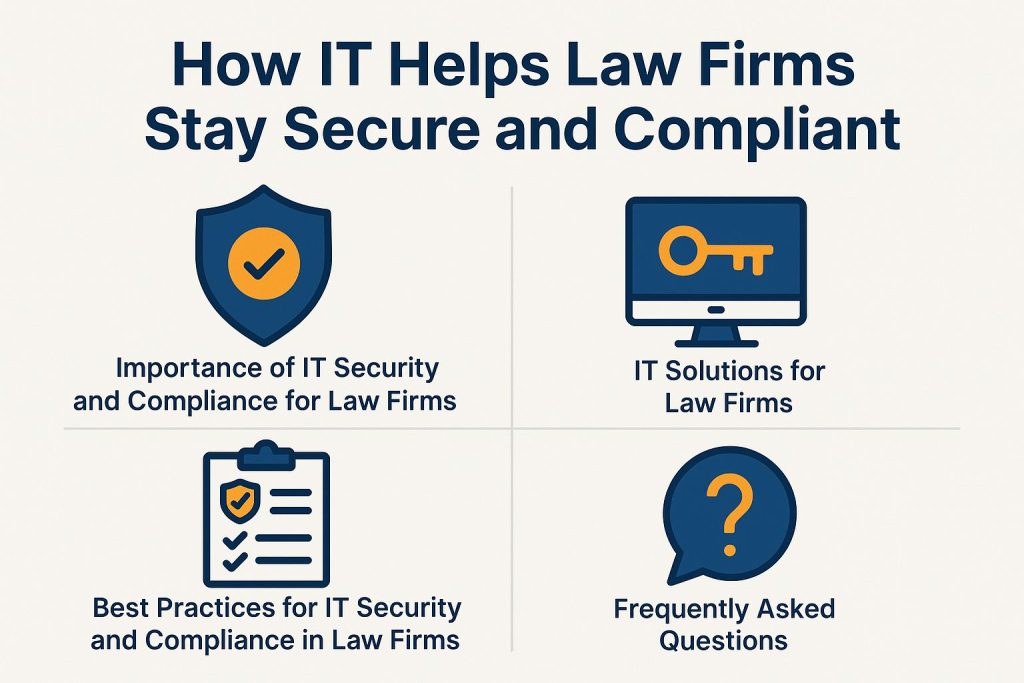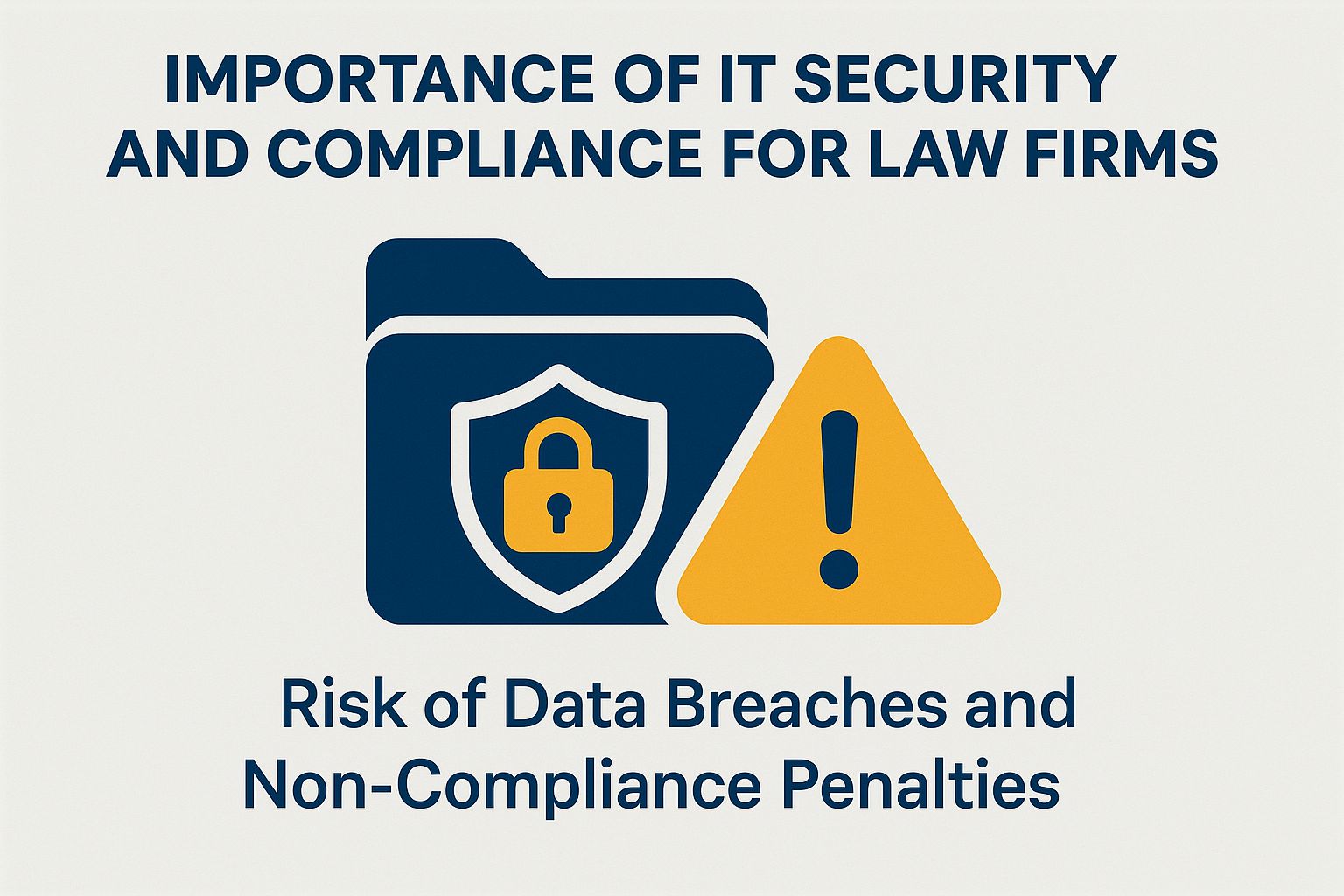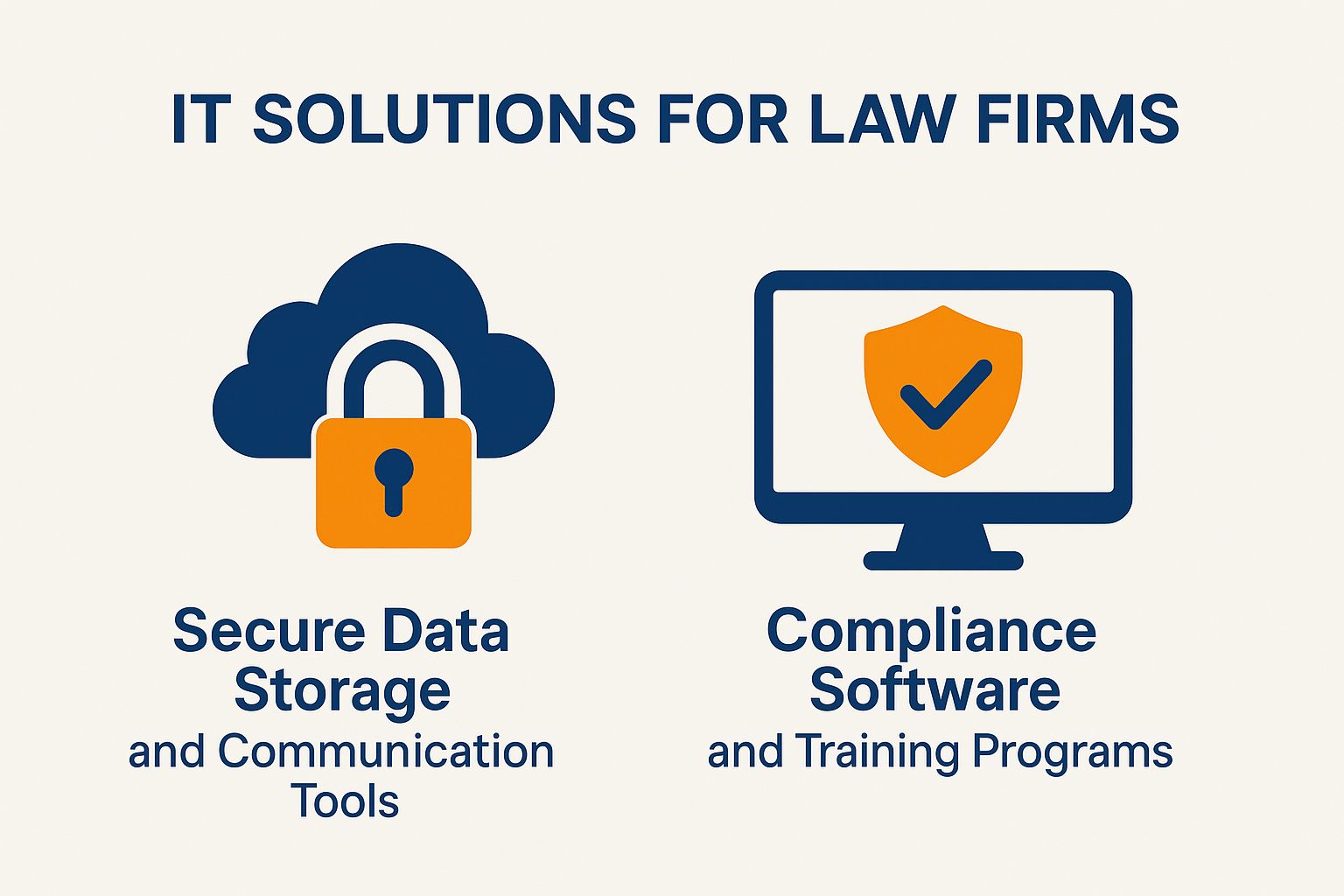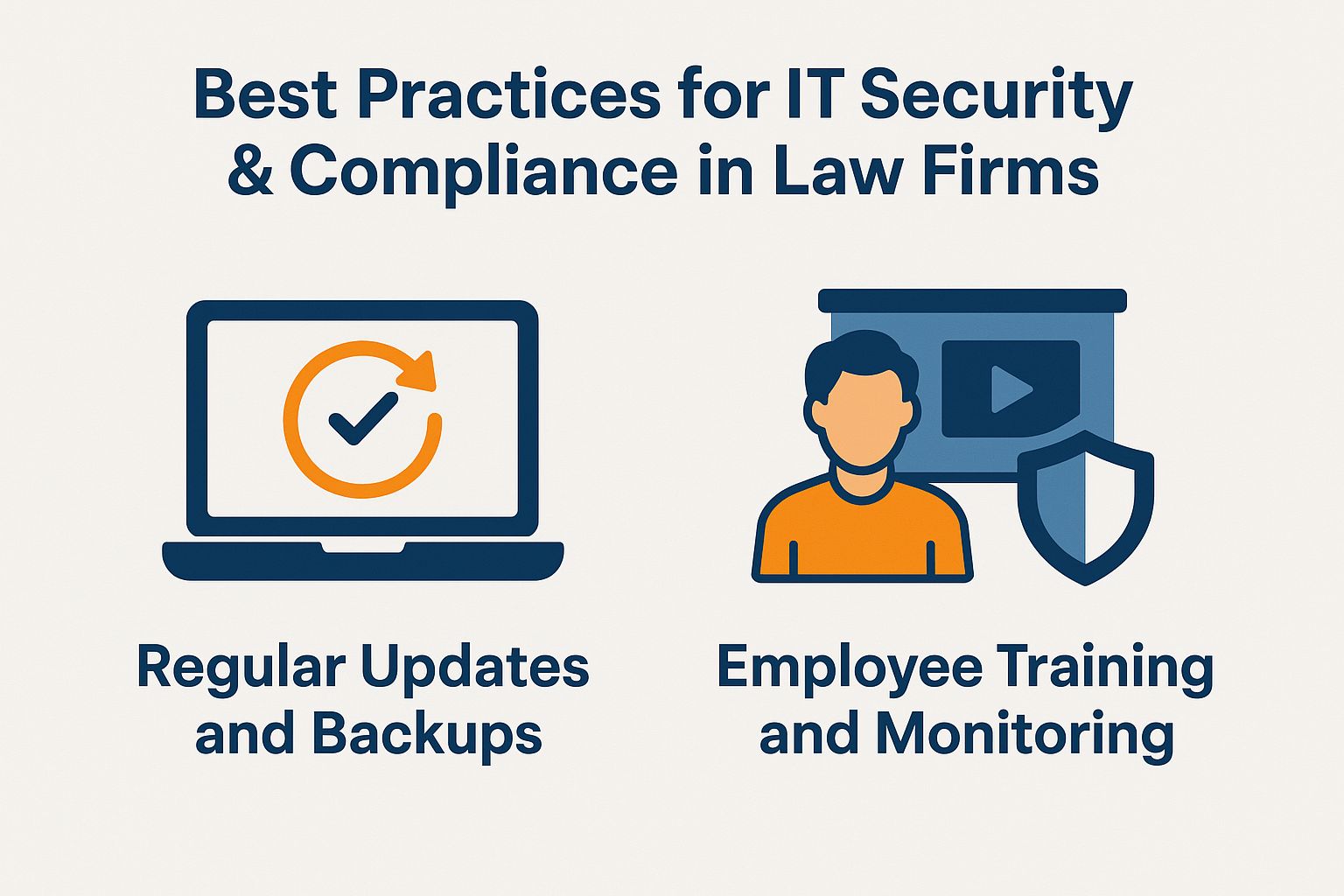How IT Helps Law Firms Stay Secure and Compliant

Today, law firms face big challenges. They must protect client information. They must also follow strict compliance rules. Data breaches are a serious risk. They can cause financial penalties and damage reputation. This shows why IT security, legal data analytics, and risk management are crucial. This article looks at how IT solutions improve data security and compliance in law firms. It addresses best practices, including secure storage solutions, effective communication tools, compliance software, and comprehensive employee training, all of which are essential for protecting legal practices from cyber threats and regulatory pitfalls. By using these strategies, law firms can strengthen defenses, secure remote access, and keep operations safe.
Importance of IT Security and Compliance for Law Firms
The deployment of disaster recovery and cloud computing are pivotal in safeguarding sensitive client information.
In today’s digital landscape, the significance of IT security and compliance for law firms is paramount. Given the rise in cyber threats and regulatory pressures, law firms must prioritize the implementation of robust IT security measures to protect client data, ensure compliance with legal regulations, and uphold client confidentiality.
Legal technology, IT governance, and risk management work together to protect sensitive information. This helps law firms follow data protection laws and build client trust.

Risk of Data Breaches and Non-Compliance Penalties
Effective incident response and threat assessment are crucial in mitigating these risks.
The risk of data breaches and non-compliance penalties presents a significant threat to law firms operating in today’s technology-driven environment. These risks are further exacerbated by inadequate IT governance, which can lead to severe financial and reputational consequences.
Organizations must understand that a breach can lead to expensive legal issues, like fines and lawsuits, and can also harm client trust. Sensitive information is at greater risk. Firms must maintain strong relationships with clients who expect complete confidentiality.
This highlights the need for thorough compliance audits and strong IT policies. Law firms can benefit from implementing a robust document management system to ensure that confidential data is well-protected and compliance is maintained.
By addressing vulnerabilities early, law firms can protect themselves and meet regulations. This helps keep their finances safe and builds client confidence.
IT Solutions for Law Firms
Incorporating cybersecurity and endpoint protection measures can significantly enhance the overall IT infrastructure.
Effective IT solutions are essential for law firms. They improve cybersecurity and help meet regulatory requirements.
These solutions include tools like legal technology and strong cybersecurity protocols. They protect client data and support secure communication. As mentioned, these strategies are critical for law firms to navigate challenges similar to those faced by many businesses, including those highlighted in our analysis of Top 5 IT Challenges Small Businesses Face in Greenville.

Secure Data Storage and Communication Tools
Adopting secure file sharing and document management systems can further enhance protection.
The implementation of secure data storage, compliance training, and communication tools is essential for law firms to protect sensitive client information and uphold client confidentiality. These tools not only safeguard data but also promote effective collaboration among legal teams.
In an age where data breaches are increasingly prevalent, the use of advanced encryption methods ensures that only authorized personnel can access sensitive documents. Access control features, such as multifactor authentication, further enhance security by preventing unauthorized entry. This level of protection is critical for legal practices that handle confidential client information, as it complies with legal and ethical standards while fostering trust between clients and their attorneys.
Secure file sharing solutions allow legal professionals to share documents safely. This prevents interception and enhances workflow in the fast-paced legal environment.
Compliance Software and Training Programs
Law firms need compliance software and training programs to meet cybersecurity standards. These tools improve understanding of regulations and promote security awareness.
There are many compliance software options for law firms. These tools offer features like automated risk assessments and real-time compliance monitoring. By implementing these solutions, law firms streamline their regulatory adherence while significantly mitigating potential risks associated with data breaches.
Training employees on cybersecurity is crucial. It helps them recognize threats and understand data protection protocols. Collectively, these strategies strengthen a firm’s defenses against cyber threats, ensuring robust protection of sensitive client information. Worth exploring: Document Management System for Law Firms in Greenville as it complements your firm’s cybersecurity efforts by enhancing document security.
Best Practices for IT Security and Compliance in Law Firms
Best practices for IT security protect client data and reduce cyber risks. These practices include IT policies, regular audits, and incident management strategies specifically tailored to the legal sector.

Regular Updates and Data Backups
Regular updates and backups are key for a strong IT security strategy. They help maintain data integrity and prevent loss. By implementing these practices, firms can enhance their cybersecurity measures and maintain operational resilience.
Timely software updates fix vulnerabilities that hackers may exploit. This protects sensitive information from breaches. When paired with comprehensive backup solutions, these actions provide a crucial layer of protection against unexpected system failures and cyberattacks.
By prioritizing updates and routine backups, law firms protect their digital assets and maintain their reputation. These proactive strategies form the foundation of a comprehensive cybersecurity plan. They help protect critical information and ensure business continuity against potential threats.
Employee Training and Cybersecurity Monitoring
Training programs are essential for law firms. They create a culture of security awareness and compliance.
Implementing employee training and monitoring programs is essential for law firms to cultivate a culture of security awareness and compliance. These initiatives enable staff to grasp IT best practices and understand the importance of safeguarding sensitive client information.
Law firms should conduct structured training sessions on important topics like phishing detection and password management.
- Phishing detection
- Password management
- The proper handling of confidential data
Regular workshops and simulations engage employees. This helps them remember key lessons on cybersecurity. Additionally, employing monitoring techniques like alerts for unusual activity enhances cybersecurity.
By employing anomaly detection systems and conducting regular audits, firms can ensure strict adherence to established IT policies and quickly identify potential security threats. This proactive approach helps maintain a robust security posture while protecting the interests of their clients.
Frequently Asked Questions
How does IT help law firms stay secure and compliant?
Legal practice management systems and electronic discovery tools are part of this strategy.
IT tools like firewalls and encryption protect sensitive legal information from threats and ensure compliance with regulations.
What are some common IT security risks for law firms?
Law firms must address issues like firewall management and secure networks.
Law firms risk cyber attacks, data breaches, and internal data leaks. This is due to the sensitive information they handle.
They may also face risks from outdated IT systems or vulnerabilities.
Can IT help law firms prevent data breaches and cyber attacks?
A comprehensive cybersecurity policy is key.
Strong security measures, like firewalls, encryption, and regular updates, can reduce the risk of data breaches and cyber attacks.
Staff must also be properly trained in IT security protocols and best practices.
How does IT ensure compliance for law firms?
Legal compliance software and audit trails are crucial.
IT systems can automatically monitor and track compliance with regulations and industry standards.
Is it necessary for law firms to invest in IT security and compliance?
Investing in identity management and security certifications is essential.
With more frequent and severe cyber attacks and data breaches, law firms must prioritize IT security and compliance. This protects clients’ sensitive information and helps maintain their reputation.
What happens if a law firm experiences a data breach or fails to comply with regulations?
Security incident management and DDoS protection can mitigate these effects.
A data breach or non-compliance can lead to legal consequences, financial penalties, and damage to the firm’s reputation.
This can lead to client loss and legal action from affected parties.
Therefore, investing in IT security and compliance is crucial for a law firm’s success and longevity.




